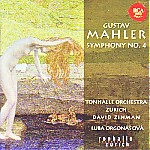David Zinman captures this music’s freshness and innocence very well. He’s particularly attentive to textural details, evident in consistently tasteful string portamentos and in his pellucidly clear but naturally flowing first-movement development section. In the same movement, though, he underplays the first big climax, as so many conductors do, but redeems himself in a wonderfully characterized scherzo featuring a particularly well-played violin solo.
The Adagio is the high point of the symphony, and the high point of this performance, one of the finest renditions on disc. At slightly more than 21 minutes Zinman’s tempo seems ideal. Each episode flows purposefully forward with utter naturalness, its expressiveness effortlessly captured–and you won’t hear those accelerating variations done more effectively by anyone. The orchestral eruption just before the end also really glitters (you can actually hear the harp glissandos–and how wonderful they sound!).
In the finale, Luba Orgonásová isn’t bad, but neither is she great. Her voice is a touch too vibrato-heavy, and you can tell she’s trying very hard, not always successfully, to keep it “childlike”. Excellent sonics make this a fine addition to a very consistent cycle, but for all that not quite one of the best versions available.
































